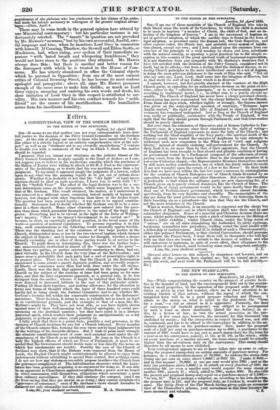TO TUE EDITOR OF THE SPECTATOR.
London, 2d April 1.850.
Sra—I am one of those members of the Church of England who take in their Mendl sense the words of its Catechism, in which the child is _declared to be made in baptism "a member of -Christ, the child of God, and an in- heritor of the kingdom of heaven." I see in the sacrament of baptism an act of spirit nal adoption of which the earthly type is found in the form of legal adoption, as practised under the Roman law the Code Napoleon' and other cognate codes, the .Hindu law, and probably every system of legiela- tion almost, except our own; and I look indeed upon the omission from our own law of the principle of a civil sonship, by choice and love, coordinate with the natural souship, as opposing a great practical bar to the simple re- ception in this country of the great spiritual truth of baptismal regeneration. It is not therefore from any sympathy with Mr. •Gorham's doctrines that I have felt satisfied with the decision of the Privy -Council, considered not in itself, but baits .effects,—but from a leelinp that the Bishop of_Exeter, in re- ducing Church principles to the mere intellectual assent to a set of dogmas, is doing the most grievous dishonour to the work of Him who said, " Not all who say unto me, Lord, Lord, shall enter into the kingdom of Heaven, but he that doeth the will of my Father which is in Heaven." I cannot, however, but feel greatly alarmed at the conduct of the High Church;party, in appealing for an authoritative decision on the point of doc- trine either to the "collective Episcopate," or to a Convocation -composed according to traditional model, r. e., in either case, to a purely clerical as- sembly. The Church of England has never been a clergy-governed church. Convocation has never represented but the clergy hitherto, not the Church. From those old days when, whether rightly or wrongly, the famous answer was given on the semi-spiritual ,question of marriage "Nolumus loges Anglire mutari," the right of the laity of England to share in church-go- vernment has remained undisputed. And so long. as the Church of England was, really or politically, coextensive with the People of England, it was right that the laity.should govern through Parliament, and that Convocation should be purely clerical. But ever since the admission of Dissenters and of Roman Catholics to Par- liament—nay, in a measure since their admission to the right of voting— the Parliament of England represents no more the laity of the Church ; and nothing but the blind stupidity of the Tory party—the spiritual death of the Church—could "have wasted the energies of Anglicans in vain attempts 'to withstand each new concession to -the Whig cry of "civil and religions liberty," instead of steadily claiming self-government for the Churoh. By their fault it is, far more than by that of their opponents, that the Church of England has been brought to that absurd and pitiable condition of having its government vested in a Parliament composed of the-adherents of every jarring creed, from the Roman Catholic Beer to the eloquent preacher of a .not-even-Unitarian chapel,—the Representative Members themselves elected by still more motley constituencies, one of which has lately staked its credit (I say not wrongly) upon the return of a Jew to the House 1 By their fault itis that we have seen within the last few years a measure in contemplation for the creation of Church Bishoprics out of Church funds thwarted by an opposition headed by Quakers and other -Dissenters. But even this.condition is preferable to that which the selfsame ,party are now clamouring for, of a Church given up to purely clerical dominion, like the Church of Rome. The spiritual lie of clergy government would be far more deadly than the prac- tical one of Parliamentary . government, which becomes almost harm/eas, spiritually, from its very injustice and thsurffity. The memorialists of the Clay are doing the most grievous wrong to the clergy, by flattering them in their besetting sin as a priesthood—the idea that they are the Church, and not the mere ministers of the Church.
What is wanted, therefore, is an assembly to represent not the clergy but the Church of England—one in which laymen shall take their seat by and outnumber clergymen. Hopes of a peaceful and Christian decision there are none, whilst party-feeling runs to such- a pitch of bitterness as the Bishop of Biteter's letter exhibits ; whilst Church clubs, under the lying name of "unions," are on all aides stimulating the hotheaded by party applause, hardening sympathies into prejudices, wailing round the most candid with a fellowship of exclusiveness. And in default of such a Church-assembly, either this polysect Parliament, or 'that clerical Convocation, should presume to mutilate the Prayer-book, I trust them will be thousands who will feel with me that they are bound to submit to the decrees of neither, and who will endeavour to maintain, in spite of every effort, their allegiance to the formularies of our Church, until revised by some really competent authority. I am, Sir, .your obedient servant, [Several other letters on this subject, by clergymen and lawyers, and on be aides of the question, haoe reached us ; but we cannot Apr° more room this week, and next week the Parliament will be in full activity.— En.]


























 Previous page
Previous page